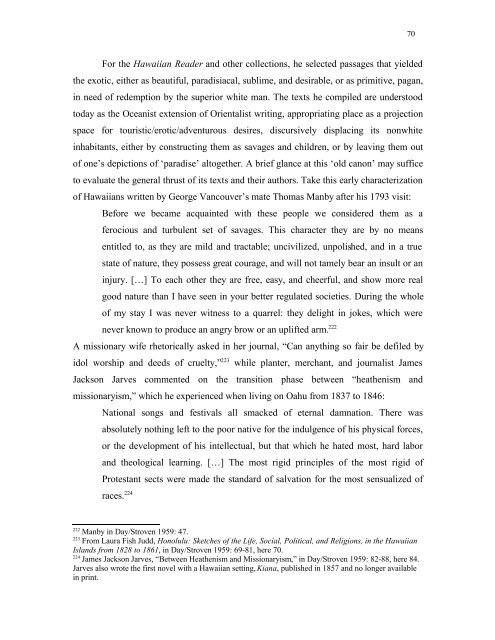A Paradise Lost - KOPS - Universität Konstanz
A Paradise Lost - KOPS - Universität Konstanz
A Paradise Lost - KOPS - Universität Konstanz
Create successful ePaper yourself
Turn your PDF publications into a flip-book with our unique Google optimized e-Paper software.
For the Hawaiian Reader and other collections, he selected passages that yielded<br />
the exotic, either as beautiful, paradisiacal, sublime, and desirable, or as primitive, pagan,<br />
in need of redemption by the superior white man. The texts he compiled are understood<br />
today as the Oceanist extension of Orientalist writing, appropriating place as a projection<br />
space for touristic/erotic/adventurous desires, discursively displacing its nonwhite<br />
inhabitants, either by constructing them as savages and children, or by leaving them out<br />
of one’s depictions of ‘paradise’ altogether. A brief glance at this ‘old canon’ may suffice<br />
to evaluate the general thrust of its texts and their authors. Take this early characterization<br />
of Hawaiians written by George Vancouver’s mate Thomas Manby after his 1793 visit:<br />
Before we became acquainted with these people we considered them as a<br />
ferocious and turbulent set of savages. This character they are by no means<br />
entitled to, as they are mild and tractable; uncivilized, unpolished, and in a true<br />
state of nature, they possess great courage, and will not tamely bear an insult or an<br />
injury. […] To each other they are free, easy, and cheerful, and show more real<br />
good nature than I have seen in your better regulated societies. During the whole<br />
of my stay I was never witness to a quarrel: they delight in jokes, which were<br />
never known to produce an angry brow or an uplifted arm. 222<br />
A missionary wife rhetorically asked in her journal, “Can anything so fair be defiled by<br />
idol worship and deeds of cruelty,” 223 while planter, merchant, and journalist James<br />
Jackson Jarves commented on the transition phase between “heathenism and<br />
missionaryism,” which he experienced when living on Oahu from 1837 to 1846:<br />
National songs and festivals all smacked of eternal damnation. There was<br />
absolutely nothing left to the poor native for the indulgence of his physical forces,<br />
or the development of his intellectual, but that which he hated most, hard labor<br />
and theological learning. […] The most rigid principles of the most rigid of<br />
Protestant sects were made the standard of salvation for the most sensualized of<br />
races. 224<br />
222 Manby in Day/Stroven 1959: 47.<br />
223 From Laura Fish Judd, Honolulu: Sketches of the Life, Social, Political, and Religions, in the Hawaiian<br />
Islands from 1828 to 1861, in Day/Stroven 1959: 69-81, here 70.<br />
224 James Jackson Jarves, “Between Heathenism and Missionaryism,” in Day/Stroven 1959: 82-88, here 84.<br />
Jarves also wrote the first novel with a Hawaiian setting, Kiana, published in 1857 and no longer available<br />
in print.<br />
70

















